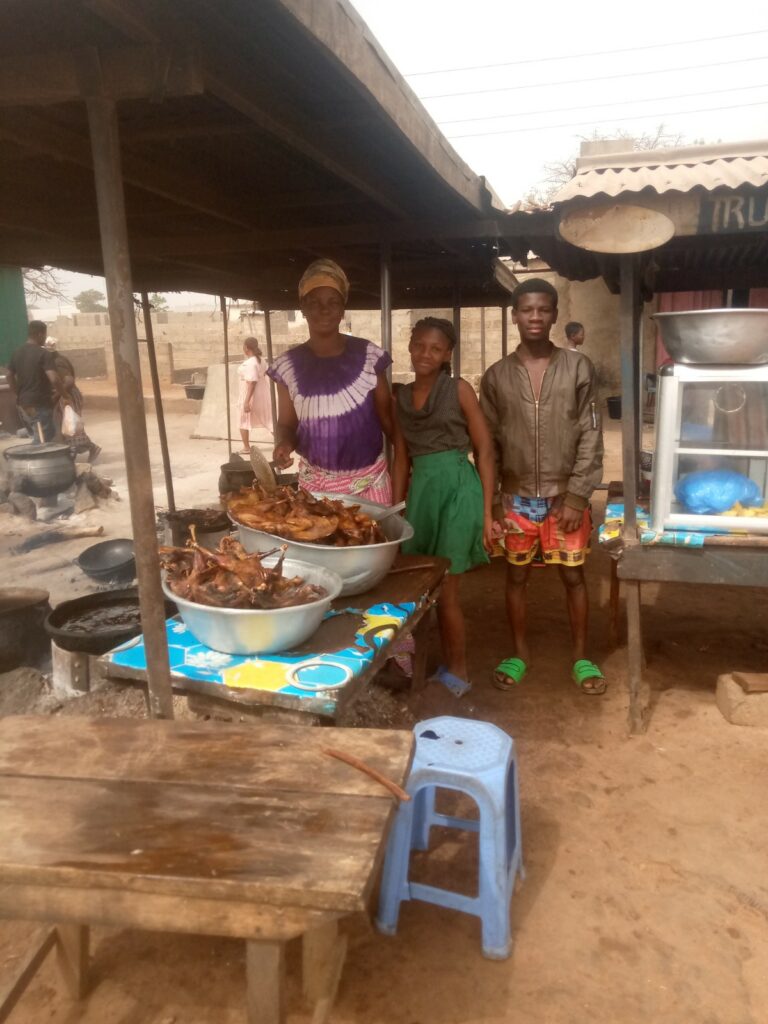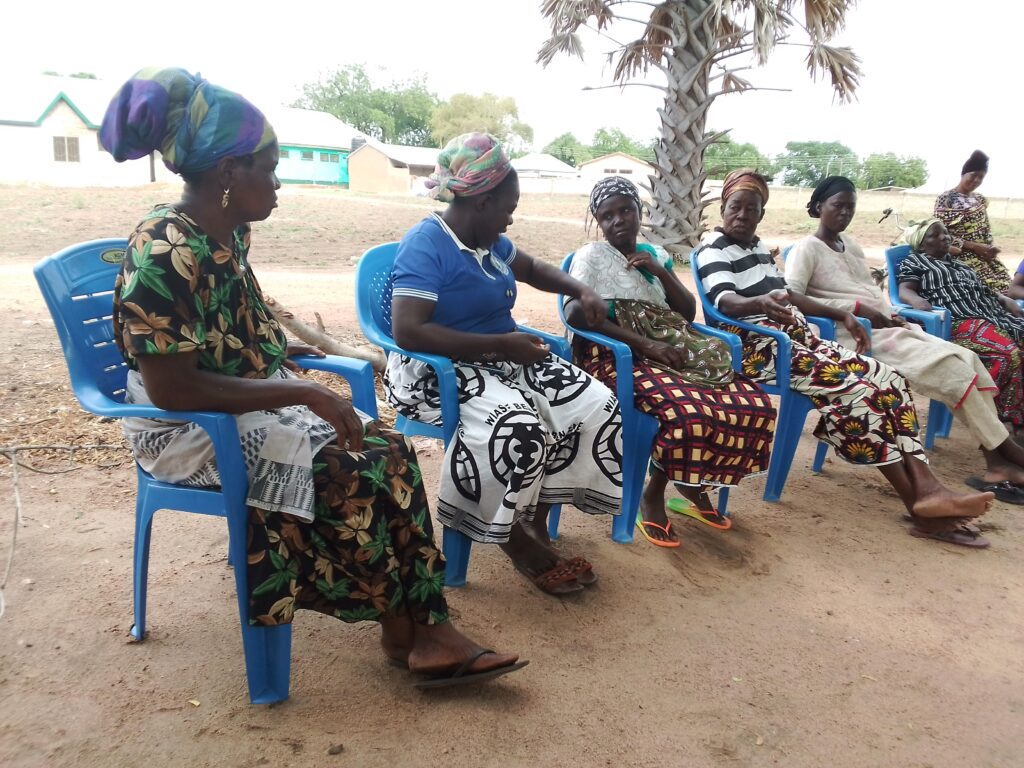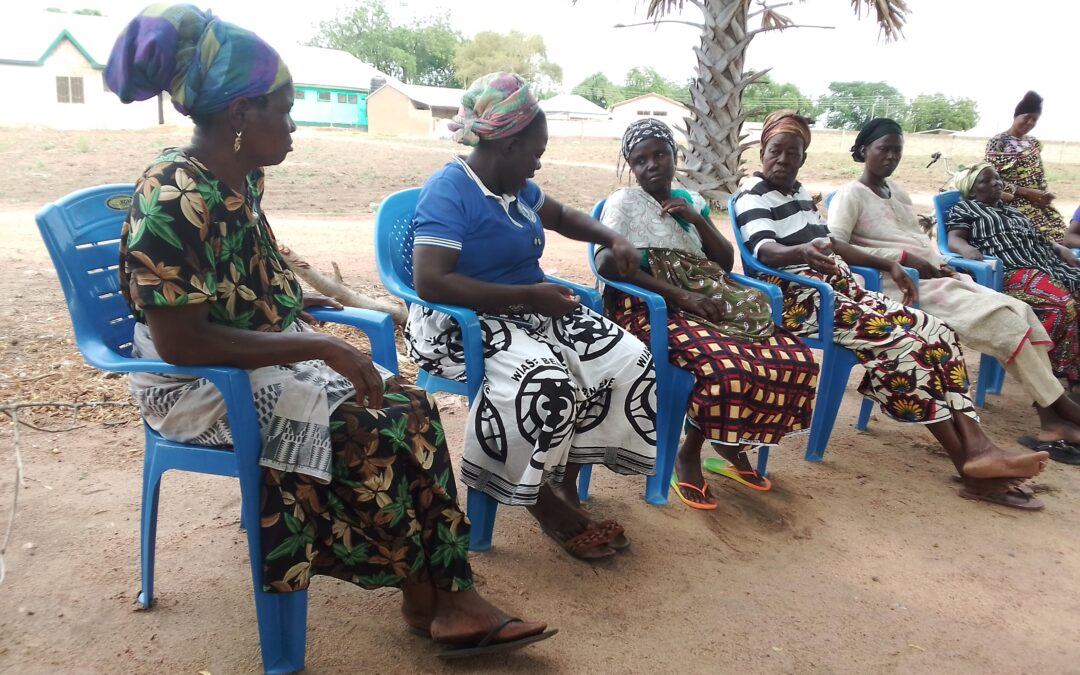By Regreening Africa – World Vision Ghana
Dorcas Asigiba, 41, is a widow and mother of four children from the Aramkoliga community in the Bawku West District of Ghana. She is also a member of the Aramkoliga Asongtaaba Saving for Transformation (S4T) Group, which has 25 members.
For over a decade, her main source of income has been frying guinea fowl and chicken, earning her a monthly income of USD 9. However, the business has not been without its challenges. She didn’t have enough meat because she didn’t make enough money to buy it in large quantities, and she didn’t know how to sell it. Therefore, she had to choose between getting more meat and taking care of her family’s daily needs.
Her joining the S4T group was a giant step toward changing her story.
She joined the Aramkoliga Asongtaaba S4T group in March 2021 after hearing about its significance from the Regreening Africa Programme. She found out about it through community awareness and a friend who was already a member of another group. She found out about the benefits of the concept and how members help each other, which made her want to join the group.

Dorcas with her children at the stall where she fries and sells chicken and guinea fowl. Photo: World Vision Ghana
Dorcas was able to get a loan from the S4T group so she could grow her meat business and do things like pay her district fees, which was always hard for her. She received USD 50 from the group, allowing her to expand her meat business, which she repays with a monthly interest of USD 2. This enabled her to purchase more guinea fowl and chicken in order to prepare large quantities of the meat for sale.
She began saving USD 2 per week after joining the group. The savings are made over a nine-month period. Her total savings plus interest at the end of the first cycle of sharing out amounted to USD 130. She used a portion of the funds to pay for her children’s education and invested the remainder in her meat business.
“Joining the group has greatly improved her business and family’s wellbeing,” she says. “This is because I am able to purchase large quantities of raw meat. It is also preferable to obtain loans from the S4T groups rather than from financial institutions, where interest rates are always high,” she added.
“The S4T group is like a family,” she says. “Even if there are some misunderstandings among some members, there is always support for everyone.”
She advocates for S4T in the entire Bawku West district as a tool for overcoming poverty and alleviating the sufferings of women and children. Dorcas Asigiba and the members of her group have also benefited from World Vision Ghana’s conservation agricultural practices training, such as tree planting and management, which they employ at home.

Dorcas (left) and her group members at one of the S4T meetings. Photo: World Vision Ghana
World Vision Ghana supports the economic empowerment of women through S4T, allowing them to participate meaningfully in economic and agroforestry practices. It also makes it possible for women and men to access alternative income-generating activities that reduce pressure on forests and forest products, thereby allowing trees and shrubs to regenerate.
Regreening Africa is a five- and half-year programme (2017-2023) funded by the European Union that seeks to improve livelihoods, food and nutritional security, resilience to climate change, and ecosystem services through evergreen agriculture. In Ghana, the programme is implemented by a consortium of international NGOs, including World Vision as the country lead and Catholic Relief Services (CRS) as the implementing partner to World Agroforestry (ICRAF).
In Ghana, Regreening Africa addresses pressing challenges to the savanna areas, such as acute and prolonged dry seasons, overgrazing (livestock pressure), rampant bush burning, and indiscreet felling of trees, culminating in declining forest cover, loss of indigenous biodiversity, and decreased soil fertility. Regreening Africa’s goal for Ghana is to improve livelihoods, food security, and resilience to climate change among smallholder farmers and restore ecosystem services by scaling the practices of evergreen agriculture. Regreening Africa’s implementation approach for Ghana includes community mobilisation, radio campaigns, stakeholder capacity building, partner implementation of field activities, multi-stakeholder engagement, campaigns, and advocacy, and support for complementary livelihood options. Regreening Africa has achieved notable success by training farmers in FMNR and bushfire management, introducing S4T interventions, and developing business plans.
This story was produced with the financial support of the European Union. Its contents are the sole responsibility of Regreening Africa and do not necessarily reflect the views of the European Union.

